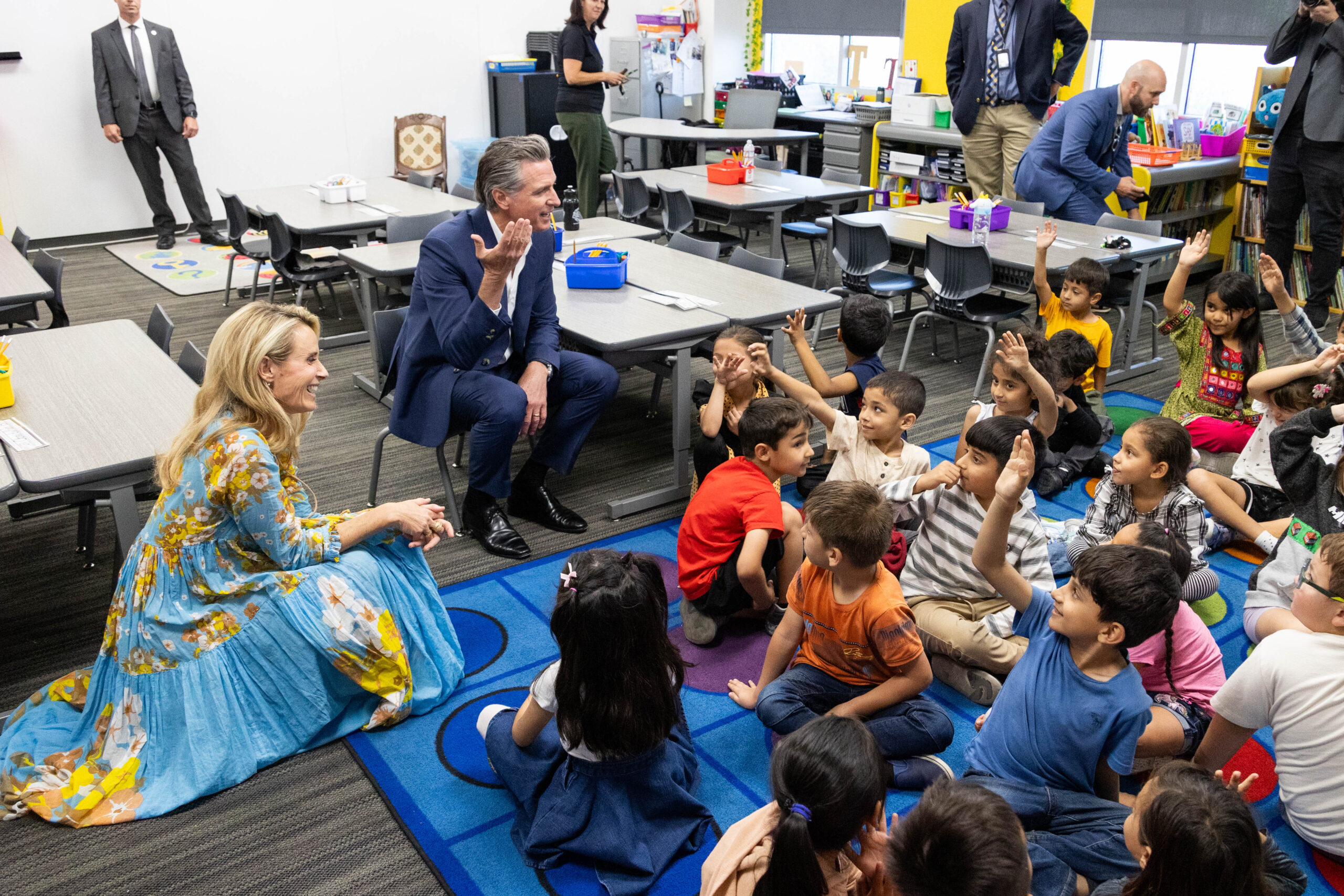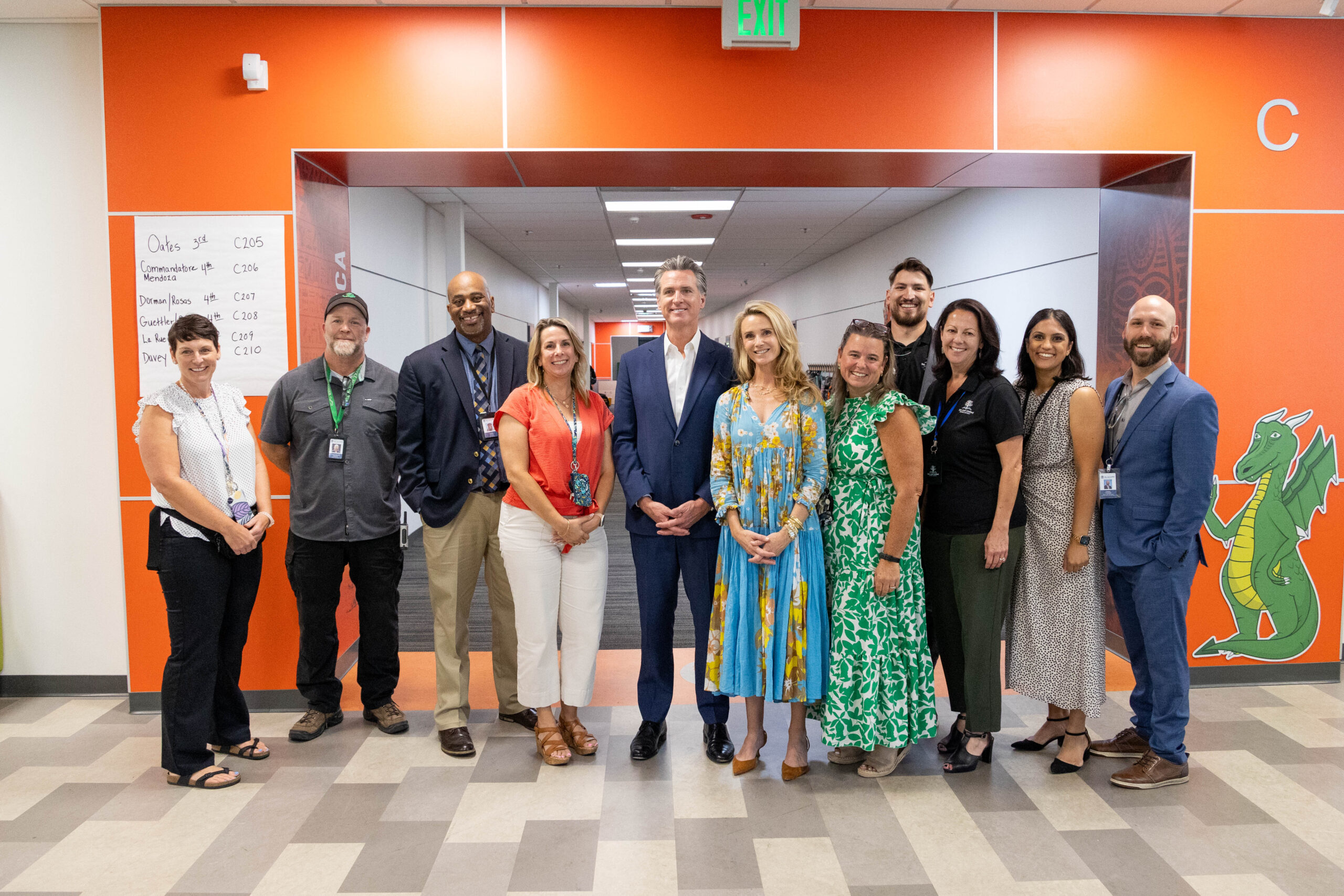Governor Newsom welcomes students back to school with literacy coaches in classrooms
What you need to know: Governor Gavin Newsom and First Partner Jennifer Siebel Newsom marked the start of the new school year by celebrating the deployment of literacy coaches and reading specialists in hundreds of California’s highest needs schools — one of several key strategies to strengthen literacy instruction and intervention for California students.
Sacramento, California – While visiting a classroom in Sacramento, Governor Gavin Newsom today welcomed California’s kids back to campus for a new school year and announced that hundreds of the state’s highest needs schools will be staffed by state-funded and trained literacy coaches and reading specialists. Additionally, an initial cohort of 2,250 educators recently completed a state-funded professional learning series and will be able to apply that training in classrooms this new school year. Educators and sites engaged in this training are supported by 12 regional hubs offering support to literacy teams with additional professional learning, covering more than 200 local educational agencies (LEAs).

Governor Newsom and the First Partner meet with students at Dyer-Kelly Elementary School.
“As we begin a new school year, California is doubling down on our commitment to our youngest learners by ensuring that no student falls behind in their reading. I know from my own challenges with dyslexia that when we help children read, we help them succeed. While other states ban books and strip funding from schools, we are dedicated to making sure that every child can have a bright future and develop their own love of learning.”
Governor Gavin Newsom
By this time next year, hundreds of literacy coaches and reading specialists will be settled into their new roles supporting students and educators, schools will have evidence-based assessments for reading difficulties and literacy resources to instruct and intervene when necessary. In fall 2025, transitional kindergarten will be universal, along with expanded learning opportunities for California kids.
“The greatest gift we can give our children is the gift of literacy and a love of reading. In California, we’ve invested in our children’s education and future through literacy coaches and reading specialists that will ensure that gift is available to every child who calls the Golden State home.”
First Partner Jennifer Siebel Newsom

Governor Newsom and the First Partner meet with San Juan Unified School District (SJUSD) and Dyer-Kelly Elementary School staff.
Efforts to strengthen literacy for California’s kids
Addressing literacy has been a key focus of Governor Newsom’s Administration. In partnership with the Legislature, the State has made historic investments in evidence-based strategies and adopted new policies focused on literacy and improving student achievement on California’s English Language Arts/English Language Development standards that collectively comprise California’s comprehensive Literacy Strategy, including training and funding for literacy coaches as described above, and:
- Screener for Reading Difficulties: Working with the Legislature, the 2023 Budget Act requires LEAs to begin screening students in kindergarten through second grade for risk of reading difficulties, including dyslexia, by the 2025-26 school year. This will ensure that 1.2 million students receive risk identification and intervention as soon as possible in elementary school.
- Literacy Roadmap: The California Department of Education (CDE) anticipates that it will begin releasing grade level modules for the Literacy Roadmap beginning in fall 2024. Modules will be released throughout the 2024-25 school year to provide all educators with specific guidance on how to implement evidence-based literacy instruction and targeted interventions for native English speakers, multilingual learners, and students with reading challenges.
- Stronger Accountability: The 2024-25 Budget requires LEAs with unexpended funds from the $6.2 billion Learning Recovery Emergency Block Grant (LREBG) to perform a needs assessment, with a particular focus on addressing low performance on the English Language Arts assessment, and incorporate into their annual budget planning process and transparently explain how they will use those funds to address the identified needs.
- Full Implementation of Transitional Kindergarten (TK): Beginning in the 2025-26 school year, universal TK will be fully implemented, and all four-year olds will be eligible. In addition to other benefits, universal TK eligibility will provide a stronger foundation for literacy for all students.
California’s family agenda on public education
- Tutoring + Literacy + Math: Schools will help students accelerate academic progress and mitigate learning loss with more than $8 billion invested in tutoring, increased instructional time, and other student supports.
- Community schools: Through California’s $4.1 billion community schools investment, parents and students throughout California have more access to schools that provide high-quality instruction and culturally competent wraparound services, including mental health support, tutoring, nutrition programs, health care, counseling and other social assistance.
- Expanded before and after school programs: All elementary school students will have access to before- and after-school programs, as well as summer learning opportunities, by 2025, reducing childcare costs for parents and giving kids a safe space to thrive.
- Universal free meals: No student needs to learn on an empty stomach, with all students having access to two free, nutritious meals per day at school – regardless of income or family status.
- Youth behavioral health: Youth ages 0-25 will have access to a revamped youth behavioral health system, including an online one-stop hub and billions invested to integrate mental health services with schools.
- More teachers, more counselors, and more paraeducators: Lower staff-to-student ratios means more support for students. Ratios will be lowered across settings and $1.1 billion in annual funding for high-poverty schools to hire up to 5 more staff each.

Governor Newsom meets with a Dyer-Kelly Elementary School student.
